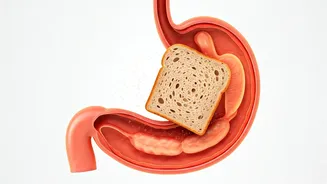Beyond Gluten Sensitivity
The common assumption that gluten is always the cause of digestive issues like bloating and gas might not be entirely correct. While gluten sensitivity
exists, a recent study published in The Lancet points towards a different component in bread as a major contributor to these symptoms. This new perspective suggests that people experiencing discomfort after eating bread might not necessarily have a gluten intolerance. It opens the door to understanding alternative explanations for why bloating and gas are occurring and prompts a reconsideration of dietary strategies for managing these digestive problems. Focusing on specific ingredients is critical instead of simply excluding gluten to find relief from digestive distress and improve overall gut health.
Identifying the Ingredient
To understand the root cause of the issue, it’s essential to identify the specific ingredient highlighted by the study in The Lancet. Without the full text of the Lancet study, pinpointing the exact ingredient is impossible. It is important to note that various bread-making components can trigger digestive issues. These can include certain additives, preservatives, or even specific types of carbohydrates that are not processed well by the body. Once the problematic ingredient is recognized, individuals can take steps to modify their diet and lifestyle to mitigate the symptoms. This could include selecting breads with different formulations, and adjusting cooking methods and timings. Awareness of the ingredients allows for informed decisions and healthier dietary habits.
The Science of Bloating
Bloating and gas result from a complex interaction between the food we consume and our digestive system. When the body has difficulty digesting certain substances, gas can form and accumulate. This can lead to the sensation of bloating. Various factors influence how the digestive system processes food, including the presence of specific enzymes and the overall health of the gut microbiome. Understanding these processes is critical for managing digestive discomfort. When the study identifies an ingredient in bread, this suggests the substance might stimulate gas production or interfere with normal digestive function. This is why more research is needed to understand how the particular ingredient interacts with the digestive system and what processes are involved in causing discomfort.
Dietary Adjustments Needed
Changing your diet can be a valuable approach to addressing bloating and gas, especially once the problematic ingredient is identified. This may involve reading labels carefully and choosing bread products that exclude this ingredient. Experimenting with different types of bread can help pinpoint which ones do not cause issues. Also, increasing fiber intake and drinking plenty of water can help improve digestion. Additionally, keeping a food diary can help you track what you eat and how it affects your body. This detailed log can help in identifying other possible trigger foods. A gradual, mindful approach to dietary changes, supported by professional advice, often results in the best outcomes. Individual needs differ, so what helps one person may not work for another. Customization is very important.
Seek Professional Advice
Experiencing persistent bloating and gas warrants a consultation with a healthcare professional or a gastroenterologist. These specialists can offer personalized advice and conduct necessary tests to pinpoint the precise causes of your discomfort. They can perform diagnostic tests to rule out serious underlying conditions. A medical expert can provide a detailed analysis of your symptoms, dietary habits, and any other relevant medical history. They might recommend specific dietary changes, medications, or other treatments designed to improve digestive health. Professional guidance ensures an evidence-based approach to managing your digestive health issues, helping to reduce the discomfort and improve your overall well-being. Always seek expert advice when dealing with persistent symptoms.














